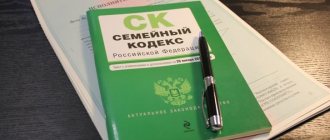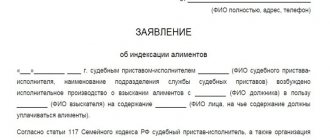Article 1135. Powers of the executor of a will
GUARANTEE:
See Encyclopedias and other comments to Article 1135 of the Civil Code of the Russian Federation
1. The powers of the executor of a will are based on the will by which he is appointed executor and are certified by a certificate issued by a notary.
2. Unless otherwise provided in the will, the executor of the will must take the measures necessary for the execution of the will, including:
1) ensure the transfer to the heirs of the inherited property due to them in accordance with the will of the testator and the law expressed in the will;
Information about changes:
Subparagraph 2 amended from September 1, 2021 - Federal Law of July 29, 2021 N 259-FZ
2) take, in the interests of the heirs, on one’s own behalf, all necessary legal and other actions in order to protect and manage the inheritance, or, if it is not possible to perform such actions, contact a notary with an application to take measures to protect the inheritance;
3) receive funds and other property due to the testator for transfer to their heirs, if this property is not transferable to other persons (clause 1 of Article 1183);
4) execute a testamentary assignment or demand from the heirs the execution of a testamentary refusal (Article 1137) or a testamentary assignment (Article 1139).
Information about changes:
Article 1135 was supplemented by paragraph 2.1 from September 1, 2021 - Federal Law of July 29, 2021 N 259-FZ
2.1. The testator may provide in the will for actions that the executor of the will is obliged to perform, as well as actions from which he is obliged to refrain, including the right to provide for the obligation of the executor to vote in the highest bodies of corporations in the manner specified in the will. In a will, the terms of which provide for the creation of an inheritance fund, the testator may also indicate the powers of the executor of the will to carry out actual and legal actions related to the creation of an inheritance fund.
3. The executor of a will has the right, on his own behalf, to conduct affairs related to the execution of the will, including in court, other government bodies and government agencies.
Information about changes:
Article 1135 was supplemented by paragraph 4 from September 1, 2021 - Federal Law of July 29, 2021 N 259-FZ
4. When performing actions to protect the inherited property and manage it, the executor of the will acts as a trustee (Article 1173). The executor of a will may transfer the implementation of trust management to a third party, unless this is prohibited by the will.
Powers and duties of the executor of a will
My friend's family is not very friendly. The family has three adult children, who often conflict, however, it was a serious surprise for them when, after the death of their father, a will was left, but it not only indicated the shares of each child, but also appointed an executor who was free to dispose of the property.
My friend, his brother and sister went to court to cancel this clause of the testamentary act, because they wanted to independently distribute the inheritance, but the court recognized the powers of the third party as completely legal and refused to satisfy the claim. In today’s article, I would like to give a full description of such a key figure in the inheritance procedure as the “executor of the will” and determine the scope of his powers, which are quite clearly described in civil law.
Executor's remuneration
The executor of the will carries out the assumed obligations to dispose of the testator's property free of charge. Obtaining the necessary certificates and paying state fees is carried out at his expense. In this case, the executor has the right to compensation for expenses incurred by him.
Receiving remuneration is possible in the event of a direct indication in the will or a decision of the heirs to pay the executor.
After entering into the right of inheritance, the heirs are required to reimburse the following expenses:
- for the protection of property;
- to pay state fees when considering a claim in court;
- utility bills for property maintenance.
The contractor is not required to provide a report on its activities, but must show supporting documentation (checks, invoices, payment orders) as evidence of expenses incurred. It is necessary to draw up a written explanation of the need for the expenditure made.
The executor must confirm all expenses with documents (checks, bills, invoices), as well as justify in writing the need for expenses and the fact that the expenses are related exclusively to the functions assigned to him. The manager is not obliged to report to the heirs for his actions, and on the basis of the lack of a report, he cannot be deprived of monetary compensation if payment papers are provided.
If the will does not indicate an executor, the heirs have the right to contact government services or commercial organizations engaged in certain activities (legal practice or real estate activities). Services are paid according to established tariffs.
Who is the executor of a will and why is he appointed by the testator?
The term “execution of a will” can be found in the civil code of the Russian Federation, and this concept is defined as an action performed by a specially appointed citizen or successor of a deceased person. Usually, people resort to this option in order to prevent disputes and quarrels among relatives regarding values and property that will remain after the death of the testator.
This is interesting: The testator has the right to make a will for 2021
Of course, a will is a fairly serious document that allows the property of a deceased person to be distributed among a circle of people determined in advance, however, such a decision may not satisfy them and the parties will still begin to conflict. In such circumstances, the executor of the will, indicated by the testator in the will, is responsible for resolving conflicts and resolving controversial issues regarding the division of property.
Only a natural person has the right to act in such a role. a person who has no personal interest in the future receipt of the inheritance of a deceased citizen. An executor is appointed by the owner of the property and usually, we are talking about a person whom the testator trusts fully and is confident that this person will carry out the entrusted matter to the end.
Responsibilities of the performer
The powers are established by a will or in accordance with Article 1135 of the Civil Code of the Russian Federation. The executor must take steps to administer the estate:
- Settle all property issues not resolved by the testator during his lifetime (collect debts, contact counterparties). The obligation to fulfill monetary obligations by the heirs is called a testamentary refusal and is subject to mandatory satisfaction. The heirs pay the creditors.
- Contact the bank to withdraw money from the account, government agencies and organizations to obtain the necessary documents, file a lawsuit with demands for forced collection of funds due.
- Interact with heirs. If their interests differ from the will of the testator as expressed in the will, disputes are resolved in court.
- Find and notify the recipients of the inheritance about the will of the testator. The executor has the right to divide the property according to the specified shares.
The Civil Code of the Russian Federation obliges executors to take all necessary measures to execute a will:
- take actions to claim the property specified in the will;
- ensure the transfer of inherited property to the persons specified in the will;
- demand execution of a testamentary refusal;
- take all necessary actions to protect the inheritance (Article 1172 of the Civil Code of the Russian Federation);
- receive the property of the testator, including funds belonging to him;
- carry out the execution of a testamentary assignment.
The inherited property is transferred to the executor for his trust management and safekeeping. To execute a will, the executor has the right to act on his own behalf in government bodies and institutions, and to act as a plaintiff in court.
What requirements are put forward to the contractor, and what is the procedure for his appointment?
The inheritance system in the Russian Federation is very complex and confusing, so experts in this field recommend following the standard. In particular, for the role of executor, it is worth choosing a person with a legal education who can quickly find a solution to a controversial situation and resolve an emerging conflict. As for the special requirements for this person, then, perhaps, there are none. The property owner has the right to choose any person, provided that the applicant is:
- fully adequate and capable;
- adult;
- has Russian citizenship.
It is important to emphasize that the testator is not at all obliged to consult with the heirs, and if there is a need for this, the owner of the property has the right to choose several people at once. Each of the selected executors will be responsible for their part of the inherited estate. The executor receives official powers only if they are properly executed and certified by a lawyer. Sometimes heirs also act as executors to simplify the inheritance process.
Certificate of appointment as executor of the will
In order to confirm the powers that the executor has, a special document is required. It is a certificate that is issued to the executor of the will by the notary at the place where the inheritance was opened.
The certificate contains a complete list of powers assigned to the executor under the will.
In the event that the testator did not describe in detail what exactly the executor has the right to do, the powers provided for in the relevant article of the Civil Code of the Russian Federation are included in the certificate.
Finally, if the certificate itself does not clearly define what the executor has the right to do, the scope of his powers is determined based on the law.
Is a person's consent required for appointment to this post?
An essential requirement for performing such an action as appointing an executor of a will is his consent. It is important that a citizen can express his approval in different ways:
- at the time of writing the will;
- on the date of opening of the inherited estate.
Consent is expressed in writing, as an independent entry on a will or as an appendix to a document. In the case where the name of the executor becomes known only after the opening of the will, the citizen is given a month to make a decision regarding the acceptance of the granted powers. Some details on the topic are presented in the video: https://www.youtube.com/watch?v=H3oY9skNXV0
Is a citizen's consent required to become an executor?
A person’s consent to his appointment as executor of a will is one of the mandatory conditions for performing this action. He can express his consent in several ways, both at the time of writing the document and at the time of opening the inheritance.
Typically, such consent is expressed in writing in 2 ways:
- an independent record of your consent to the will when working together with the testator, an additional statement attached to the will. Since this application is strengthened by the signature of a notary, after the death of the person the executor automatically receives his powers;
- In cases where the name of the appointed executor is revealed only after the death of the testator, then the person has a month to decide whether he is going to accept this role. If during this period no application for consent has been received from him, then it is considered that the performer has refused. Also, the fact of legal actions on his part to execute the will is taken as consent.
Let's celebrate! From this we can conclude that no one can forcibly appoint a citizen as his executor without his consent - this is considered a voluntary action, and not a legal obligation.
Powers and duties of the executor of a will
The full range of powers of the executor is determined by the Civil Code of the Russian Federation. Usually, we are talking about the execution of the main provisions of the will. If we talk about specific actions, the performer is obliged to adhere to the will of the deceased. Separately, it should be said about the responsibilities of the executor. In this case, we will talk about the following actions on the part of the executor:
- transfer of the inherited estate to the successors of the deceased in the amounts specified in the will;
- ensuring protection of inheritance;
- contacting a lawyer from a notary office;
- receipt and transfer of property by successors.
All these actions are described in civil legislation and are not indicated in the testamentary instrument, since they are meant to be executed without fail.
What powers are vested in the executor?
The powers of such an assistant are prescribed in the will and must not contradict the letter of the law. If the testator does not name a list of his obligations, then entrusting the execution of the will to the executor is permitted according to the generally accepted procedure established by law. In any case, the purpose of the entire procedure is to fulfill the will of the deceased.
Competence of the authorized person:
- Facilitating the transfer of property from the testator to the designated recipients.
- Taking measures to protect the inheritance (on its own or with the participation of the notary system) and manage it.
- Carrying out legal actions on behalf of the persons involved in the inheritance case and within the framework of their rights and obligations.
Various actions fit these general descriptions. A more precise formulation of the powers concerns the receipt of funds due to the testator during his lifetime and their transfer to the heirs (or other persons, for example, as part of debt obligations). If the will contains an indication of the implementation of certain conditions (testamentary assignment), then the executor can control this situation.
Instead of results
I would like to end the article with a few conclusions on the topic:
- Any citizen who meets the simple requirements of the law can be appointed executor. This person is chosen as the owner of the property.
- The citizen must agree to perform this role, and his powers are officially confirmed by a notary.
- The executor has certain obligations and after the death of the testator, the person receives certain powers to distribute property among the successors.
Who is the executor of a will: powers and duties of a citizen
In accordance with the legal norms enshrined in the articles of the Civil Code of the Russian Federation, the term “execution of a will” means certain actions of the heirs entitled to the bequeathed property. Sometimes a pre-appointed so-called executor - the executor of the will - begins to deal with the opened inheritance case. His main and, perhaps, only duty is to ensure that the will of the deceased, recorded in the testamentary document, is strictly observed. The law gives him the right to resolve potential conflict situations. For this purpose, the executor of the will is provided with special, legally established opportunities under the Civil Code of the Russian Federation.
This is interesting: Joint will of the Civil Code 2021
Dear readers! The article talks about typical ways to resolve legal issues, but each case is individual. If you want to find out how to solve your particular problem for FREE , contact a consultant:
It's fast and free !
How to resolve disputes between heirs and executor?
Nowadays, it is quite common for conflicts to arise between heirs, especially if the bequeathed property concerns huge sums of money.
It is in these cases that it is good to have an executor, but what can you do when the dispute arises directly between the executor and the heirs? In this situation, there is only one way out - litigation.
If the heirs have proven that the executor is not fulfilling his duties in good faith and is abusing his position, then he may be removed from his functions. Other ways to resolve such conflicts have not yet been established.
Let's celebrate! An executor of a will is a third party who does not have any benefit from the will and helps stop conflicts that arise. Usually this is an old acquaintance of the deceased, to whom the testator entrusts his will. The executor has rights only in relation to the bequeathed property solely within the limits established by law and the testator.
Didn't find the answer to your question? Find out how to solve exactly your problem - call right now: +7 (Moscow) +7 (812) 309-53-42 (St. Petersburg) It's fast and free!
Who is an executor of a will?
In an ideal situation, the executor is an individual who is absolutely not interested (and this is a mandatory requirement!) in how the property will be divided. He makes sure that in practice what the testamentary disposition says is reproduced down to the finest nuances.
Naturally, one who has studied in the specialty “law” will better understand all the vicissitudes of inheritance matters. However, this is not at all mandatory. The main thing is that the identity of the person who will do this should be clearly and clearly stated directly in the will. Necessary:
- indicate the passport details of the executor;
- place of his permanent registration.
When there is more than one person executing a will (the maximum number is established by Article 1134 of the Civil Code of the Russian Federation), in order to avoid confusion in the document, the testator must clearly state what specific part of his will he entrusts to which of the people he has chosen, in order to know in detail which of them accepts what and puts it on himself. In order for the executor of a will located in Russia to be able to easily cope with the obligations assigned to him, three parameters must be met:
- a person (individual) must have legal capacity;
- there was a duly recorded consent of the citizen to be the executor of the will;
- if everything is in order with the previous points, the executor must obtain the appropriate certificate from the notary.
It is this that plays a primary role in dividing the property mass and resolving possible conflicts. In fact, the executor of the will has a moral responsibility to ensure that after the death of the deceased, his last will is executed correctly and legally competently.
It does not matter significantly to whom these powers will be entrusted immediately after the opening of the inheritance - to some completely stranger or to someone who himself has the right to inheritance. Anyone who bequeaths his property is not obliged to consult with his successors.
The powers of the executor of a will are actually needed in order to, when faced with controversial issues or unexpectedly revealing any problematic circumstances, act exclusively on the postulates expressed in the last will of the deceased. Accepted powers can also be considered confirmed if it turns out that the person has already fulfilled them within a month from the day the inheritance opened.
Rules for the execution of a will
For the purpose of proper execution of the last will of the testator, civil law provides for the institution of executor of the will. As V. Budovnits notes, the executor of a will, being a person not interested in satisfying the subjective claims of the heirs, has more opportunities to prevent conflicts and disputes between the heirs on issues related to receiving an inheritance.
Execution of a will - in civil law, this is the performance of necessary actions to implement the will of the deceased, expressed in the will. The execution of a will is entrusted to the heirs appointed in the will or to the executor of the will specified in the will. heirs or the executor of the will specified in the will.
The following may be appointed as executor:
- citizens included in the circle of heirs by law;
- citizens who are not included in the number of heirs by law; legal entities.
Grishaev S.P. believes that the execution of a will is understood as the commission of actions of a legal and factual nature, both directly provided for by the will and not specified in it, but necessary to ensure the possibility of realizing the will of the testator as expressed in the will.
The execution of a will as a legal relationship has its own characteristics.
When this legal relationship arises, its initiator (testator) is no longer the bearer of either rights or obligations, and, naturally, does not participate in the relationship in question.
The executor of the will finds himself in the role of a debtor, but only in terms of fulfilling all the duties assigned to him by the testator and the law, but not as a person responsible for the debts and other obligations of the deceased testator.
At the same time, the existence of certain rights (requirements) of the executor of a will allows him to be considered not only a debtor, but also to be included in the category of creditors of persons whose obligations correspond to this right.
Many authors (Guyev A.N., Telyukina M.V., etc.) often compare relations for the execution of a will with relations of representation, since the executor is obliged to carry out a number of legal acts. With this interpretation, the question arises of who the executor of the will represents. Since the testator had already died by the time the powers of the executor arose, he cannot be considered a legally capable subject. The heirs also cannot be considered represented, since the executor does not carry out their will, but performs actions prescribed by the testator.
From the above it follows that the executor is the representative of the inheritance itself. However, since the inheritance is not endowed with the rights of a legal personality and is not a subject of law, the relationship for the execution of a will cannot be recognized as a representation, especially since the executor acts on his own behalf and not on behalf of another person.
Thus, relations for the execution of a will are an independent type of legal relationship with its own characteristics, composition and characteristics.
The current Civil Code of the Russian Federation specifies the rules on the execution of a will. It is possible for the testator to entrust the execution of the will to a citizen - the executor of the will (executor), who must express consent to this. This provision is recognized by world practice and is applied in most developed countries of the world. A novelty of the Code of the Russian Federation is the clarification that “the consent of a citizen to be the executor of a will is expressed by this citizen in his own handwritten inscription on the will itself, or in a statement attached to the will or in a statement submitted to a notary within a month from the date of opening of the inheritance” (Part 1 of Art. 1134 Civil Code of the Russian Federation).
It should be noted that while previous legislation provided for the need to obtain the consent of the intended executor at the time of drawing up the will, the current Code allows for subsequent approval. Actual actions to execute a will, performed within a month from the date of opening of the inheritance, can also be regarded as consent.
It is important to note that the period for a citizen to give consent to become an executor of a will is a month from the date of opening of the inheritance, however, the inheritance itself can be accepted within 6 months from the date of its opening.
The heir, as a rule, accepts the inheritance by submitting an application to a notary or a person authorized by law at the place where the inheritance was opened.
If the application was submitted by the heir after the end of the month from the opening of the inheritance, i.e. death of the testator, the question arises: has the executor of the will lost the right to consent to the execution of the will? Sadikov O.N. argues that the moment of giving consent for a citizen to assume the functions of executor of a will is associated with the opening, and not with the acceptance, of an inheritance. This moment is the same for the beginning of the period: for the executor of the will - a month, for the heirs - 6 months (Article 1134 of the Civil Code of the Russian Federation).
The law currently does not answer the question of whether the one-month period is preemptive (i.e., whether the executor of a will is deprived of the right to execute the will if he has expressed his consent after the expiration of the month) and whether it is possible to restore this period. This issue requires further clarification.
According to the new rules (Article 1136 of the Civil Code of the Russian Federation), the executor of a will, in addition to reimbursement from the funds of the inheritance for the necessary expenses associated with the execution of the will, has the right to demand remuneration from the inheritance, if this is provided for by the will. The Civil Code of the RSFSR imperatively established the gratuitous nature of the services provided by the executor of the will. M.V. Malyarevsky rightly notes that under such conditions there could be no question of such an institution developing in Russia, such as, for example, representation in court.
What is the legal nature of the remuneration to the executor of a will, if its receipt is provided for by the will? Taking into account the fact that a will is a one-sided transaction, such remuneration cannot be attributed to remuneration received under the contract; any other conclusion would directly contradict paragraph 5 of Art. 1118 of the Civil Code of the Russian Federation. According to A.N. Guev, there is a new legal institution in domestic inheritance law - “remuneration based on a unilateral transaction - a will.”
Often in judicial practice the question arises: who is obliged to execute a will if the heir under the will, to whom the testator entrusted the execution of the will, refused such an obligation, or was released from it after the death of the testator and was unable to execute the will?
A.N. Guev believes that the systemic interpretation of Art. 1133 and Art. 1134 of the Civil Code of the Russian Federation shows that this obligation passes to other heirs under the will.
In these circumstances, the controversial situation can be resolved by introducing Art. 1133 of the Civil Code of the Russian Federation stipulates that if the heir under the will, on whom the testator has entrusted the execution of the will, refuses such an obligation or is removed on the grounds established by Article 1117 of the Civil Code of the Russian Federation, the obligation will pass to other heirs under the will, who execute the will by agreement between yourself. If an agreement is not reached - in proportion to the shares in the inheritance.
This problem can be solved by introducing the institution of sub-appointment of the executor of a will, which will avoid serious problems in practice and resolve many of the issues that will be discussed.
So far, Article 1134 of the Civil Code of the Russian Federation does not provide for the possibility of appointing several executors of a will, or sub-appointing another executor in case the original one is released for some reason from executing the will, or dies before the heirs take possession of the inherited property. At the same time, there is such a need. When several executors are appointed, the distribution of executor functions may be established in the will or determined by the executors themselves.
Grudtsyna L.Yu. considers it possible to appoint several executors of a will, but notes that if there are several such persons, it is necessary to indicate in what part the will is executed by each of them.
If there are several executors of a will, serious problems may arise, for which there is no clear solution in the current legislation. According to the Civil Code of the Russian Federation, the obligations of co-executors of a will are joint and several only if the subject of the obligation is indivisible (Article 322 of the Civil Code of the Russian Federation). In all other cases, co-executors are obliged to carry out posthumous orders in equal shares, while each is responsible only for his own actions (Article 321 of the Civil Code of the Russian Federation). Such conclusions are quite controversial.
If the subject of the circumstance under consideration is considered indivisible, it should be recognized that the testator does not have the opportunity to accurately determine the rights and obligations of each appointed co-executor. If we do not consider the relationship that has arisen as an equity obligation, the question arises: how to divide the shares of participation in the fulfillment of this obligation among the executors and who should do it? Probably, in this case, the executors can enter into an agreement among themselves on the division of rights and obligations for the execution of the will.
But another question arises - to what extent does such an agreement correspond to the will of the testator, who appointed several persons as executors, and, apparently, had in mind their concerted actions to carry out orders made in the event of death? To solve these problems, it is necessary to enshrine in the provisions of the Civil Code of the Russian Federation the provision that in the case of the appointment of several executors, their rights and obligations are joint and several, unless otherwise follows from the contents of the will.
From the meaning of Article 1134 of the Civil Code of the Russian Federation, it is clear that the refusal to exercise his powers by the executor of a will must be resolved in court, both at the request of the executor and at the request of the heirs.
In this case, the court must establish the circumstances that prevent the person from being the executor of the will. If the court determines that there are no such circumstances, then it does not have the right to satisfy the request of the heirs. This norm is new - the previously in force Civil Code of the RSFSR did not provide for such a possibility.
The issue of releasing the executor from the performance of his duties is considered in a special proceeding, since the court decides not a dispute about the right, but the presence of facts that prevent the executor from continuing to perform his functions. In this case, a necessary prerequisite for the release of the executor of the will from his duties is the presence of valid reasons that present an obstacle to the further performance of the duties of the executor.
It can be assumed that the need to use the judicial procedure will not arise when several executors are appointed in the will without defining the rights and obligations of each of them. Since in this case the interests of persons interested in receiving the inheritance are not violated, the refusal of one of the executors, in the absence of objections from the remaining executors of the will, can be made at any time by submitting an application to the notary's office.
The current civil legislation does not regulate the issue related to the ability of the testator to appoint an executor of the will and to appoint several executors of the will.
In accordance with part three of Article 1175 of the Civil Code of the Russian Federation, the creditors of the testator have the right to present their claims to the heirs who accepted the inheritance within the limitation period. Before accepting the inheritance, creditors' claims may be brought against the executor of the will or against the estate. If the creditors have presented their claims to the executor of the will, the court will suspend the case until the heirs accept the inheritance.
According to V.V. Plekhanova, vesting the creditors of the deceased with this right is only a way of identifying persons who had property claims against him at the time of the testator’s death. In this case, we are not talking about any satisfaction by the executor of the will with claims or claims. We can agree with this point of view.
Thus, only the heirs who accepted the inheritance can be responsible for the affairs of the testator. But at the same time, the principle of universal hereditary succession, enshrined in the law on inheritance, does not deprive the executor of the will of the opportunity to reclaim property from the debtors of the testator in order to include it in the estate.
How is the executor appointed and selected?
Executors become executors on one of three established grounds and established by Russian legislation. The executor of the will may be:
- Any person appointed in advance as a testator, regardless of how the heirs react to this. This choice is a classically verified option, correct from the point of view of objectivity. The person tasked with becoming the executor must be a disinterested, disinterested person. If a will is later prepared with a different text, a completely different executor can be appointed at the same time.
- One of the heirs, appointed at the time of opening of the inheritance by other heirs. In this situation, the executor of the will is often the one of those claiming the inheritance who lives closest to the other claimants from the place where the will was opened. After all, for many reasons it is easier for him to deal with the documentary side of the issue. In such situations, since the appointment of the executor was not made by the testator, the powers of the executor of the will are not absolute. They mainly concern the speedy resolution of controversial issues.
- A specialist delegated by the state (this also includes regulatory authorities and other government agencies). Similar situations arise when among the heirs there are persons entitled to additional guarantees. For example, control of specialists vested with power is mandatory when it is necessary to ensure the rights of special categories of legal successors (without violating the legal rights of others). These include pupils from orphanages and other specialized institutions.
This is interesting: Is it possible to appeal a will after the death of the testator 2021
The first and second options differ only in who exactly confers the rights of the executor - the testator personally or the legal successors.
Who can act as executor of a will?
The executor of a will or executor is a person who carries out the instructions specified in the text of the will: allocates shares in property, transfers specific things to their future owners, etc. Let's figure out who can be an executor and what his powers are. .
According to Russian inheritance law, the execution of the orders that the testator made in the text of the will is entrusted to the heirs. Who exactly and what exactly will do - they have the right to decide independently. However, situations may arise when the execution of a citizen’s last will will be carried out by a certain person - the executor of the will. This person is also called the executor.
Typically, an executor is appointed when the testator wants to avoid disputes between heirs. At the same time, the executor of the will is not required to be one of the heirs of the citizen: the executor may well be a complete stranger.
To begin administering an inheritance, only one thing is required: this person must be expressly named as the testator in his will. Actually, this is why the institution of executors does not apply to inheritance by law - in this situation, all issues have to be resolved by the heirs themselves.
For the same reason, the executor of the will cannot be appointed by the heirs: the law directly states that the executor is appointed only by the testator. This does not mean that one of the heirs cannot deal with issues of execution of the inheritance - however, such a person does not receive a certificate, but acts according to the rules provided specifically for heirs.
It is controversial whether the presence of several executors is allowed, or everything should be entrusted to only one citizen to whom the certificate is issued.
What powers does the executor of a will have?
All testators want that after their death, the inheritance they leave will be received by exactly those heirs to whom it was bequeathed. And if a will has not been drawn up, each testator wants the inheritance to be divided fairly according to the law between relatives. Sometimes, to oversee the implementation of his last will, the testator will appoint an executor of the will, otherwise known as an executor.
You will learn more about who the executor of a will is, his duties and powers from this article.
What are the powers regulated by?
Ch. 62 part 3 of section 5 of the Civil Code of the Russian Federation contains articles 1133 – 1140, which describe all the powers of the executors of the will. About who is called the “executor of a will”, Article 1134 of the Civil Code of the Russian Federation. Article 1135 of the Civil Code gives powers to the performer.
Usually the testator prescribes the powers of the executor in the will, and then it is these rights that are vested in the executor of the will. If the scope of rights is not specified specifically, then the duties of the executor of the will are determined by Article 1135 of the Civil Code. All powers of the executor are confirmed by a certificate, which is drawn up by a notary.
Who is an executor or executor?
According to Article 1134 of the Civil Code of the Russian Federation, the executor of a will is the person to whom the testator entrusts the execution of the will. But a citizen can become a performer only if he himself agrees with this role.
Consent must be present in the will (signature on behalf of the executor), in a separate statement, or expressed in actual actions to execute the will. It is impossible to force the execution of a will without the consent of the appointed executor. If he gave his consent, but later changed his mind, then the citizen also has the right to refuse the role of executor of the will, but through the court.
Who could it be?
According to this article 1133, the executor may not be chosen ; the executor may be one of the heirs or any person uninterested in the inheritance who is chosen by the testator.
Warning
The only thing that can prevent the selected executor from fulfilling his duties is incapacity, since such a citizen will not be able to perform legal actions and defend inheritance rights in court.









